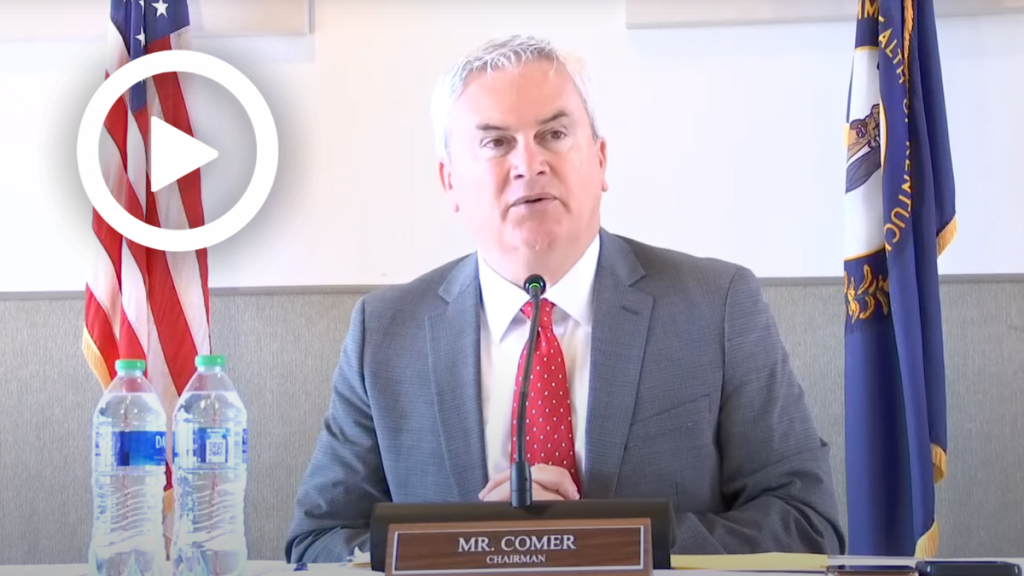Comer Opens Kentucky Congressional Forum to Examine Army Corps’ Inconsistent Fees Charged to Marina Owners
WASHINGTON — Today, House Committee on Oversight and Accountability Chairman James Comer (R-Ky.) delivered opening remarks at a congressional forum in Jamestown, Kentucky titled “A Burden to Business: The U.S. Army Corps of Engineers’ Assessment of Administrative Fees.” In his opening statement, Chairman Comer emphasized information obtained by the Oversight Committee, along with a study conducted by the Government Accountability Office (GAO) shows the U.S. Army Corps of Engineers has been levying inconsistent, unexpected, and exorbitant fees against small business owners. He noted unclear fees pushed by the Corps can cripple small businesses, particularly local marina operators in Kentucky, and hurt further investment in recreational infrastructure locally and nationwide. Chairman Comer highlighted the MARINA Act, legislation he introduced to address the lack of transparency and unclear fee policies and concluded that Congress must continue to explore solutions to ensure the Corps is issuing all fees consistently and fairly.
Below are Chairman Comer’s remarks as prepared for delivery.
Good morning. I would like to welcome everyone to today’s Congressional forum regarding how the U.S. Army Corps of Engineers assesses administrative fees.
As most of you know, I serve as the Chairman of the House Oversight and Accountability Committee in the U.S. House of Representatives.
Our Committee works to eliminate waste, fraud, and abuse in federal programs and to ensure taxpayer funds are being used appropriately.
One of the biggest privileges I have as Chairman of this Committee is being able to advance priorities that help the interests of Kentuckians that reside in the First Congressional district, especially when those priorities intersect with nationwide concerns.
The economy of the First Congressional district, like many other districts across the country, is heavily dependent on the tourism industry that lakes and other forms of outdoor recreation provide.
For example, in 2022, Lake Cumberland hosted over 2.5 million visitors, and stands as one of the crown jewels of our state’s tourism industry.
Lake Cumberland was ranked the number one lake spot by USA Today in 2023 – outranking places like Lake Superior and Lake Havasu.
The number of economic benefits this amount of tourism provides to this area is incredible.
Within 30 miles of this lake, the economic impact is over 1,100 jobs, over $164 million in visitor spending, $107 million in sales, and over $33 million in labor income.
It is vital for the economic health of Kentucky for businesses that contribute to the tourism industry operate freely and without burden from bureaucratic intervention.
Beneath the surface of Lake Cumberland’s scenic beauty lies a matter of concern that warrants our attention: the impact of real estate administrative fees imposed by the U.S. Army Corps of Engineers.
The Corps, as a component of the Department of Defense plays a role in managing water resource projects across the nation.
The Corps imposes these fees on those who utilize its managed real estate, including privately operated marinas on the lakes, such as Lake Cumberland.
These fees, intended to cover administrative expenses incurred by the Corps, have raised significant apprehensions among stakeholders.
As a result, the Committee on Oversight and Accountability asked the Government Accountability Office to examine the complexities surrounding the Corps’ management of these fees.
The Government Accountability Office, or GAO, is the investigative arm of Congress and serves as a watchdog to improve the performance of the federal government.
GAO recently completed their study on how the Corps manages these fees revealing concerns.
These concerns centered on the often excessive, inconsistent, and inadequately justified nature of the fees, casting a shadow of uncertainty over the regulatory landscape governing infrastructure on Corps managed property, such as Lake Cumberland.
Moreover, GAO’s examination revealed discrepancies in the Corps’ practices across different divisions and districts, raising questions about the uniformity of fee-setting criteria and the adequacy of information provided to fee payers.
Such inconsistencies not only undermine confidence in the fairness and transparency of the fee-setting process, but also hinder the ability of stakeholders to plan and invest in the development of infrastructure for recreational purposes at Corps managed property across the U.S.
As we gather here at Lake Cumberland today, it is incumbent upon us to explore the ramifications of GAO’s findings, particularly in the context of Kentucky’s tourism industry and the vibrant communities that surround Lake Cumberland.
Any impediment to the accessibility, affordability, or transparency of recreational opportunities at not only Lake Cumberland, but any other Corps managed property around the country, could have far-reaching consequences.
I recently re-introduced the Maintaining Access to Recreational Industry and Necessary Adjustments Act, or the MARINA Act, to address these concerns.
This legislation standardizes the framework for calculating administrative fees.
It also caps the amount of sales on items with a low profit margin that can be used to determine a marina operator’s annual rent to the Corps.
This bill defines when administrative fees may be charged, ensures they are for non-routine Corps district functions, and extends initial lease terms to 50 years and renewals to 25 years.
I look forward to working with my colleagues in the U.S. House of Representatives to see this important legislation across the finish line.
In pursuit of these objectives, I look forward to engaging in constructive dialogue with the Corps today who will hopefully be able to discuss ways they are working to remedy these problems.
I also look forward to hearing from GAO on the findings of their report, and the recommendations they have made to the Corps.
I want to thank our witnesses for traveling from across the U.S. to be here today to tackle this important issue, and I look forward to the insights and recommendations that will emerge from our discussion at today’s forum.
